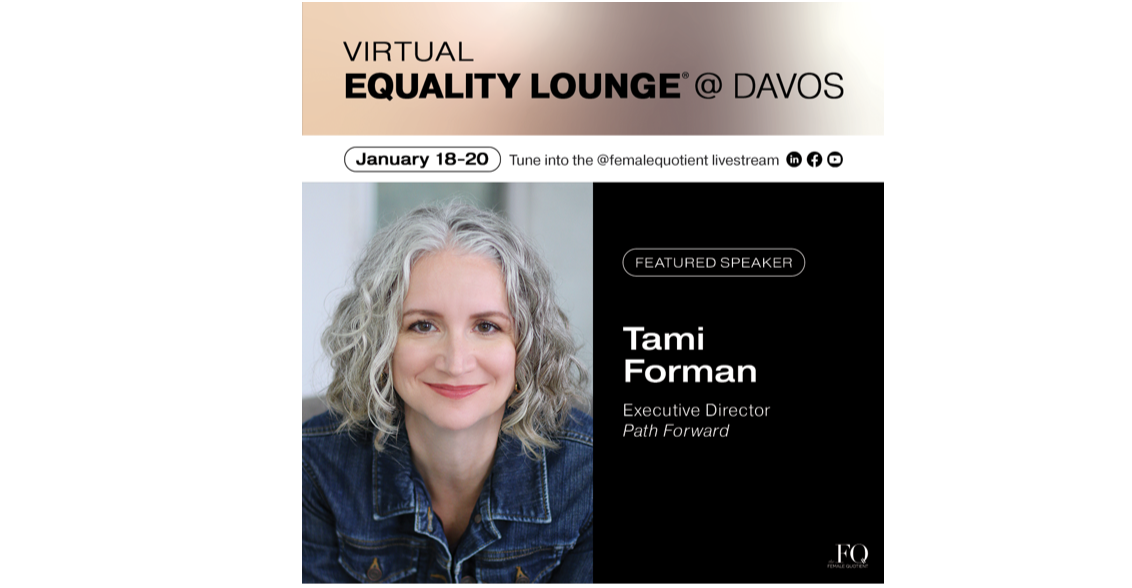On January 18, Path Forward founder and CEO Tami Forman joined The Female Quotient’s virtual session at the Davos Equality Lounge, which brought together talent and thought leaders to discuss “The Power of Parental Leave and Returnships.”
Tami joined the panel, moderated by Quartz at Work Senior Reporter Cassie Werber, alongside McKinsey & Company Senior Partner and Global Chief Diversity, Equity, and Inclusion Officer María del Mar Martínez; Inspired HR CEO and Founder Debby Carreau; The Atlantic Executive Director of Insights Gina Bulla; and P&G Senior VP of IT and Global Business Services April Cielica. Together, the panel discussed the current challenges facing working mothers, and how parental leave policies and returnship programs could help bridge the equality and leadership gap in the workforce.
Working mothers face a double challenge when taking parental leave and returning to the workforce. More companies have begun to create parental leave policies, offering a solution – but there is often a hesitation among employees to take leave, for fear of being penalized in the future. The panel discussed the importance of having senior leadership encourage leave-taking by setting an example, with April Cielica sharing that, as a senior VP, she transitioned into a part-time schedule while her child was young.
In the United States, the issue is exacerbated by a lack of early childcare support. As Tami noted, “In our community, the average time out of the workforce is six and a half years. And that is because we live in a society that does not fund childcare until first grade. And there’s no magic to that number. It’s because of a specific public policy that we have in place.”
Returnships offer a way to help. And, as Tami explained, these programs are most successful when they have the support of senior managers and executives, and have working parents in their leadership ranks to provide a model for advancement. “If the only people who end up in the corner office are the people who never take leave and have stay-at-home wives, the message gets sent. And it’s the same thing with returnship programs…companies that do a great job [in returnships] have senior managers and CEOs who say, ‘this is going to work.’ The reason returnship programs work so well, when they get established in companies, is because when people start hiring, the role models are there.”
The growing flexibility in work environments that have grown out of the pandemic could offer working moms a solution towards better work-life balance. “Flexibility is going to be good for individual women, no matter what, in terms of financial security and staying attached to the labor force,” according to Tami. But the panel agreed that the popularity of hybrid work schedules is a double-edged sword – particularly if companies reward only those employees who are able to come into the office full-time and if mothers continue to shoulder a disproportionate portion of the domestic labor at home which necessitates the flexibility in the first place.
Any solutions to the challenges working moms face in today’s workforce, whether in the form of policy, flexible work schedules, or returnship programs, have to be long-term – not just a response to the pandemic. “The pandemic did not cause all of these problems, they’re long-standing. There’s a perpetual theme of not needing to create long-term plans for remote work, remote schooling, childcare, because the pandemic will be over soon. [But] women’s workforce participation rates in the US leveled off in the nineties,” Tami concluded. “If we’re not careful, we’re going to wake up in 20 years and realize we have not budged in leadership. That’s where the inequity of policies will show up. Companies have to look at their policies with an equity lens.”
For more insights from this panel, see the article “Conscious Leaders are Championing Parental Leave and Returnship Programs—Here’s Why You Should, Too” on Forbes,
